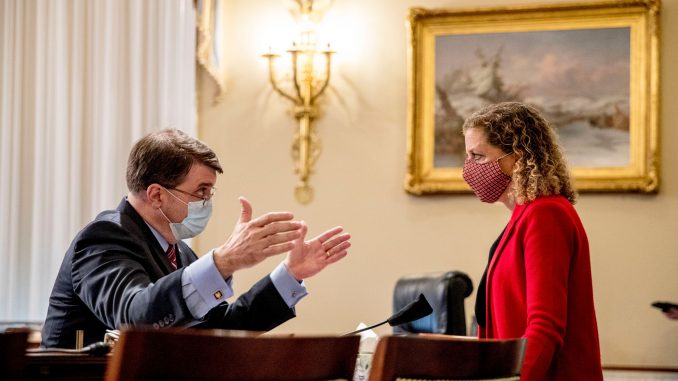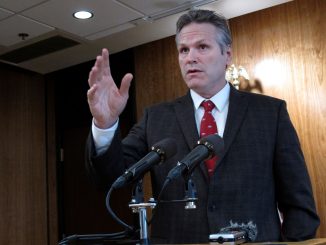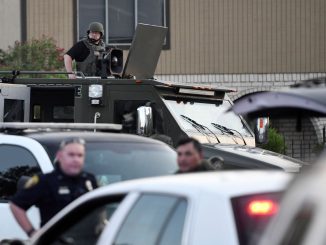

Veterans Affairs Secretary Robert Wilkie told Congress Thursday that headstones on the graves of German prisoners of war in two VA cemeteries in the U.S. deserve to be placed in “historical context” rather than be removed.
Amid a growing chorus in the House of Representatives and religious and civil rights advocates for removal of the headstones, Wilkie said the markers serve as a reminder of the “horrors of anti-Semitism … and the Nazi cult” and should be explained rather than replaced.
Read Next: Milley: DoD ‘Absolutely Considering’ Hazard Pay for Activated Guard, Reserve Troops
“Erasing these headstones removes them from memory … we cannot erase the horror,” Wilkie told members of the House Appropriations Military Construction and Veterans Affairs Subcommittee during the mask-to-mask hearing. “My view is we need to look at historical interpretations that I am more than happy to put up.”
The headstones at the center of the controversy are the at Fort Sam Houston National Cemetery in San Antonio and the Fort Douglas Post Cemetery in Salt Lake City. They mark the graves of junior enlisted personnel who died as prisoners of war in the early 1940s and whose bodies were never claimed.
While headstones belonging to other German POWs in the cemeteries have no markings, the three in question are engraved with an Iron Cross, a swastika and an inscription that says the troops died “far from [their] home for the Fuhrer, people and fatherland.”
The Military Religious Freedom Foundation has threatened to sue the Department of Veterans Affairs for the removal of the symbols. The group’s chairman, former Air Force officer Mikey Weinstein, said he was alerted to the headstones by a retired colonel who saw them while visiting the grave of his Jewish grandfather at the Fort Sam Houston cemetery.
On Memorial Day, a bipartisan group of lawmakers wrote Wilkie demanding that he launch the process required under a historic preservation law to remove the headstones.
The Southern Poverty Law Center, the Anti-Defamation League, the American Jewish Committee and B’Nai B’Rith International also have sent letters to VA calling for replacements.
“This is deeply troubling to learn that several VA cemeteries contain graves of German POWs that feature swastikas on the headstones as well as inscriptions that honor Adolf Hitler,” Rep. Debbie Wasserman Schultz, a Florida Democrat who chairs the appropriation subcommittee, said during the hearing. “These graves sit right alongside men and women who fought for our country and our ideals — ideals that run counter to everything the swastika and Nazi ideology represent.”
“I think you should replace these stones with just a regular stone that still says they were German POWS, but that’s it, and take all the Nazi symbolism off,” added Rep. John Carter, R-Texas. “If someone wants to preserve the tombstones for historical purposes … they can preserve them in some other way, but I don’t think they should be displayed daily to the American public.”
Wilkie maintains that regulation of the headstones falls under the National Historic Preservation Act, a section of which calls for the American Commission for Historic Preservation and other interested parties to provide input before the federal government embarks on any project — including alterations — at a designated historic property.
He described that process as “lengthy” and has directed VA staff to explore all options for handling the issue.
Wasserman Schultz accused Wilkie of “hiding behind” the law, which she argued does not prevent him from removing the markers. She noted that the VA, by its own policy, will not engrave anything on VA issued headstones that would “disrupt the solemnity or cause an adverse impact on its cemeteries.”
Both cemeteries were transferred to the VA National Cemetery Administration cemetery from the U.S. Army — Fort Sam Houston in 1973 and Fort Douglas in December 2019.
Wilkie, an avid reader of history, told lawmakers he is committed to finding a solution that will “educate and remind people why veterans in the cemeteries fought against the horrors from 1941 to 1945.”
“I think putting them in context in the cemeteries is the way forward,” Wilkie said. “We have the same goal in mind.”
— Patricia Kime can be reached at Patricia.Kime@Monster.com. Follow her on Twitter @patriciakime.
Related: Suspension of Military Honors at National Cemetery Compounds Loss for Families
© Copyright 2020 Military.com. All rights reserved. This material may not be published, broadcast, rewritten or redistributed.





Be the first to comment